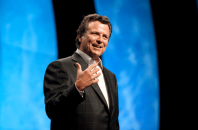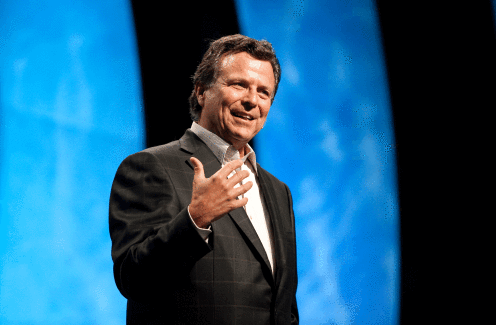Neal L. Patterson passed to the hands of his Lord on Sunday, July 9, 2017, from complications of recently recurrent cancer. He was 67.
Neal’s story is defined by hardiness, perseverance, and purpose. For a technology CEO, Patterson came from improbable origins. Born Dec. 10, 1949, in Anthony, Kansas, he was the middle son of tenant farmers Wendell and Betty (Newberry) Patterson. Neal spent his early life working wheat fields on the Oklahoma-Kansas border. Wendell had a Depression-hardened work ethic, exemplified by his insistence that his sons should not stop their work until they made “one last round after sundown.”
 Risk was inherent to the Patterson family’s life as farmers. When Neal was a child, he and his father once watched a hailstorm destroy an entire year’s crop – the family’s sole source of income. Living through the aftermath, Neal said, provided an important lesson in resilience. As an adult, Neal spoke of the similarities between farmers and entrepreneurs. Both were susceptible to conditions beyond their control, and their success over time was based on planning, hard work, adaptability, neighborliness, and courage to go forward after apparent failure. Neal believed that agrarian values had remarkable relevance to the American experience.
Risk was inherent to the Patterson family’s life as farmers. When Neal was a child, he and his father once watched a hailstorm destroy an entire year’s crop – the family’s sole source of income. Living through the aftermath, Neal said, provided an important lesson in resilience. As an adult, Neal spoke of the similarities between farmers and entrepreneurs. Both were susceptible to conditions beyond their control, and their success over time was based on planning, hard work, adaptability, neighborliness, and courage to go forward after apparent failure. Neal believed that agrarian values had remarkable relevance to the American experience.
From an early age, Neal was fascinated with the way technology added value to life. The Patterson’s first farmhouse did not have indoor plumbing or heat, apart from a single propane heater. As his family’s circumstances improved, Neal welcomed each change to farm and home — the beginning of a lifelong enthusiasm for the “next new.”
Neal’s modest upbringings encouraged him to work hard in pursuit of his own change. He received support along the way from his parents and Scoutmaster, who helped Neal achieve the rank of Eagle Scout four years early. In a town of a few hundred, he also started first grade a year ahead of schedule, so that the only other boy would have a playmate in his class. After graduating Anthony High School in 1967, Neal was accepted to Oklahoma State University. He raised livestock to pay for his tuition. There, he championed efforts to raise funds to rebuild the Pi Kappa Alpha fraternity after his chapter’s house was destroyed by fire. He made lifelong friends at OSU, earning a degree in finance in 1971 and a master’s degree in business administration in 1972. He spent the first six years after graduation as an information systems consultant and manager for Arthur Andersen & Co., now Accenture, in Kansas City.
In 1979, at age 29, Patterson left his job to co-found Cerner with Andersen colleagues Cliff Illig and Paul Gorup. The young entrepreneurs saw the potential of application software to transform paper-based, information-driven industries. After identifying a need in clinical medicine, they helped define the emerging medical software industry. The company was driven by Neal’s belief that “architecture matters.” His foresight into how health care would evolve, paired with his willingness to invest and take risks, allowed Cerner to distinguish itself from best-of-breed competitors by developing a fully integrated suite of clinically focused software over the next decade. Even while its first software platform experienced commercial success, Patterson pushed the company to completely rewrite the platform and solutions to meet complex future needs.
Today, Cerner is one of the world’s most innovative and admired companies, with health IT platforms and solutions in use in more than 25,000 facilities in more than 30 countries. Patterson guided Cerner since the company’s inception. He earned a reputation as a rare entrepreneur who led the technology company through repeated cycles of growth and reinvention. Neal tended to downplay his role in Cerner’s success, maintaining that he surrounded himself with very smart people, and that success followed hard work and often luck. Those who worked with him, however, describe him as a brilliant visionary and systems thinker. His boldness and persistence built an extraordinary company.
Patterson was also an impatient, outspoken chief executive with high expectations for himself and others. In addition, Neal had a remarkable wit, warmth and sense of inclusiveness that won people over. Those who knew him well understood that it was this unique mix of attributes that made him an exceptional leader.
Neal never micromanaged. He worked hard to become a better leader, studying the habits of successful businesspeople including Ewing Kauffman. In the early 1980s, Kauffman, then a mentor, told Neal that the type of people he would want to work for Cerner were essentially volunteers — smart people who could work anywhere but chose Cerner because they were challenged and felt a sense of pride in their jobs. Patterson took this message to heart. He was often the first to see potential that others could not. Neal asked — and often pushed — his associates to become more than they believed they could be. They responded. He will be greatly missed by all those he inspired along the way.
Apart from work, Neal gave time to causes in which he believed. He was an active supporter of the American Royal Association and the First Hand Foundation. He also strove to foster entrepreneurship as he believed that successful entrepreneurs changed communities for the better, not just by creating jobs, but also by caring about and investing in the community. When Kansas City risked losing its Major League Soccer team, Neal stepped in and worked to improve the franchise and rebranded it as Sporting Kansas City.
To family and friends, Neal was a man of brilliant thoughts and a big heart. Despite his busy mind and schedule, he loved bringing people together. Traditions were important to him, whether that was driving a combine at harvest, bowling with family after Thanksgiving dinner or getting classmates together for an OSU Cowboys game. He especially enjoyed passing skills and values down to a younger generation. Every Patterson can bait their own hook.
He loved telling stories and frequently had a hand in creating them. Friends and family knew that hanging out with Neal would often include a physical contest, a mental challenge or an adventure. Behind it all was a recurrent theme of wanting the people he cared about to test themselves, know themselves, and grow in boldness and self-reliance.
Neal cherished each member of his family. He loved Jeanne’s creative energy. He was proud of each of his children and marveled at their differences and potential. When he was diagnosed with cancer in 2016, his family was there. They worked together to ensure that he was never alone — something he described as humbling and awe-inspiring. Neal passed surrounded by family and close friends.
“One last round after sundown.” Consistent with his father’s mantra, Patterson continued working throughout his initial cancer treatment, and even after cancer returned in 2017. He considered his work as more than a profession, something akin to a calling. In the end, Neal was much like the volunteers Kauffman described — he could have taken his talents anywhere, but chose to focus them on health care and on improving the lives of others. He did this because he cared about the mission and pursued this goal ferociously.
He squeezed the most out of every day. But he always took the time to watch the sunset. Even his last.
Patterson was preceded in death by his parents, Betty and Wendell; a nephew, Scott Patterson; and a sister-in-law, Linda Patterson. He is survived and will be greatly missed by his wife of nearly 30 years, Jeanne Lillig-Patterson; their children, Cortney and Will Patterson; as well as his oldest son, Clay Patterson and daughter, Lindsey Patterson Smith, along with their spouses Carrie and Matt and their mother, Carol Katzer; his grandchildren, Dean, Katherine, Alex, and Georgia; brother, Kent Patterson and wife Gini; brother, Bryan Patterson and wife Lauri; and by his many beloved in-laws, nieces, nephews and friends. His family wants Cerner associates to know that he was proud of them and confident that Cerner will remain a visionary company. He believed an exciting era was still ahead.
Former United States Senator John Danforth and Pastor Adam Hamilton will lead a public funeral service on July 13, 2017, at 11 a.m. at Church of the Resurrection in Leawood, Kansas. Live video of the service will be available at cor.org/memorialsonline. A private burial service will follow. Anyone wishing to leave a public remembrance may do so by sending an email to memories@cerner.com. Assistance provided by Funeral Advocates LLC. Memorial donations may be made to the American Royal Association, First Hand Foundation, Oklahoma State University or the Gamma Chi chapter of Pi Kappa Alpha. Donations are preferred, but flowers accepted. His generosity will stay alive through the Patterson Family Foundation.




